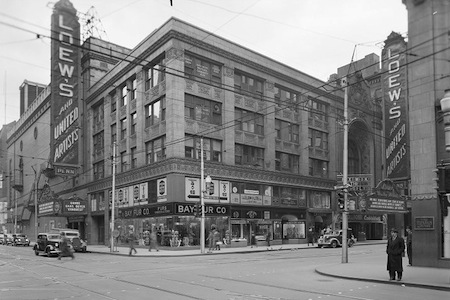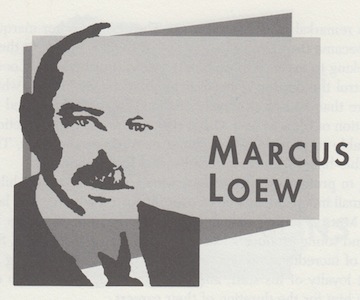Born: May 7, 1870, New York, NY
Died: September 5, 1927, New York, NY
You must want a big success and beat it into submission.
—Marcus Loew
Peep-show purveyor Marcus Loew had already failed in business twice before acquiring a penny arcade in 1905. His third attempt would be blessed by smart partnerships, good fortune and old-fashioned tenacity. Loew was bolstered by the savvy purchases of small vaudeville venues and theatrical halls in Manhattan and Cincinatti with partner Adolph Zukor. With a strong interest in the future of motion pictures, he converted every building to exhibit them. Zukor left the company to concentrate on distribution, and by 1907, Loew owned some forty theaters all over the country. In a short time, he would be the king of a new empire. As one of the only movie barons to focus on theaters early, Loew would hold the keys to the cinematic kingdom and rule the industry for a lifetime.
He wisely moved to Hollywood to keep close to the people who made films. As the new center of movie production, Southern California was plagued by threats from the Edison Trust. The tense situation called for wisdom, and Loew decided to steer clear of all conflict by simply displaying the films of Thomas Ince and Jesse Lasky without making any of his own. He would leave the independents to fight the battles while he raked in the grosses.
As he added theaters, he began to differentiate them by their names, Loew’s Chinese Theater being the most famous. The clout Marcus Loew carried was remarkable, and his Chinese Theater and other marquee establishments became the places to premiere prestigious films. He then went to Europe looking to expand his empire overseas. But by 1912, Loew realized that to control the destiny of his four hundred movie houses, which represented more than half of all theaters nationwide, he would need to control the production of films as well. Other theaters owned by production companies were able to provide a frequent stream of popular stars. They could supply double-billed features and add serials to the showings.
Looking to protect his investments with a steady flow of exhibits, Loew absorbed small independent studios over the next few years. The largest purchase was Metro Pictures, which had contracted directors like Erich von Stroheim and young producers like Irving Thalberg and David O. Selznick. A small man of incredible business acumen, Loew demanded long hours and the utmost loyalty of his staff, and he received it. Most studio executives stayed with him for the duration of their careers.
Both feared and respected, he was able to fend off attempts by William Fox and Adolph Zukor to force theater owners to purchase packages of features, cartoons and shorts in order to get films starring big names like Mary Pickford. Loew held steadfast against monopolistic practices that affected smaller theater owners. These ethical decisions were rewarded years later when government regulation required Loew to relinquish many of his theaters. He sold large portions to old competitors and placed Metro talkies in the theaters of others.
In 1924, after Loew bought Sam Goldwyn’s corporation, he struck an agreement with Louis B. Mayer to consolidate under the name Metro-Goldwyn-Mayer, or MGM, with Loew’s, Inc. being the parent company. With the strong support of theaters and deep resources, Loew became the most powerful man in the industry. He plotted a new course for MGM by scouting the biggest names and concentrated on quality productions, quickly molding the new studio into the largest maker of motion pictures in the world.
A heart attack in 1923 forced him to retire from the business before theaters became widespread around the world. With the benefit of better health, he would have been among the richest men in the world in a few more years. Still, at his death in 1927, his personal fortune was well over $30 million. Among people who have dominated and influenced the exhibition of movies, he is outranked only by William Fox, and the great film exhibitors who would mold the way audiences watch movies, such pioneers as Samuel Rothafel and Richard Hollingshead, never came close to exerting the power over movie theaters that Marcus Loew exercised throughout his long career.
To read all the republished articles from ‘The Film 100,’ go to Reintroducing the Film 100 here on Keyframe.





